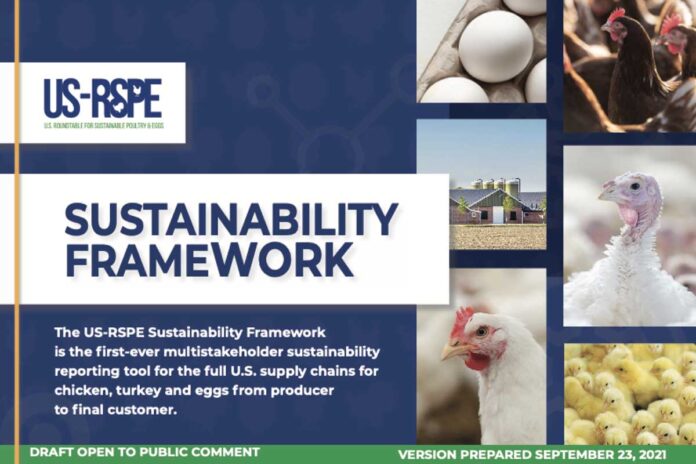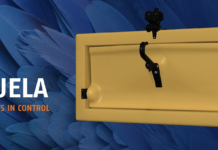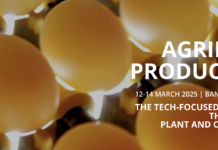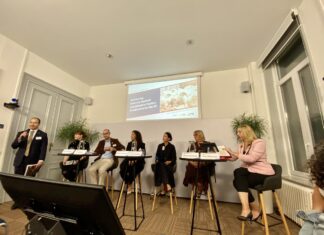
The U.S. Roundtable for Sustainable Poultry & Eggs announced that its full supply chain sustainability assessment tool can be included in chicken, turkey and egg companies’ 2022 sustainability programs.
For the first time, the sustainability of the full U.S. chicken, turkey and egg supply chains will be measured through a scalable and independent tool developed by all poultry stakeholders — the US-RSPE Sustainability Framework. US-RSPE announced the successful completion of key development milestones and the launch is set for early 2022.
“As a global food company, we have a responsibility, now more than ever, to be more sustainable,” said Jessica Langley, director of sustainability at Pilgrim’s and JBS USA. “However, it will take the entire value chain to make an impactful difference as we all move forward. It’s equally important for all stakeholders in our supply chain, regardless of size, to be able to work together to continue to improve. US-RSPE gives us a pathway to work together.”
Driven by its exceptionally wide multistakeholder approach, the US-RSPE Sustainability Framework has been in development for more than four years and includes measurements of sustainability that affect the planet, its people and poultry. The development process included two recently completed public comment periods, which generated just under 200 comments, and eight full supply chain pilot assessments across three industries (chicken, turkey and eggs) completed earlier this year.
“In a time where numerous requests are being made to complete surveys and sign onto commitments that have varying approaches and intentions, I am most excited about the US-RSPE Sustainability Framework,” said Lankford Ruffin, director of environmental affairs and sustainability for Butterball. “Because it was built specifically for poultry and eggs, I can integrate it into our existing sustainability program easily. And I’m confident the metrics included are important to our stakeholders.”
Far beyond anything tackled by this industry before, comments and member engagement incorporated input from consumers, world-renowned researchers, environmental groups, feed associations, farmer-led organizations, welfare experts, social compliance and safety organizations, restaurant chains, retailers and grocery stores and poultry producers, processors, suppliers, breeders and everyone in between in allied industries.
“As protein demand continues to rise globally, it’s more critical than ever that poultry products are produced in a way that conserves finite resources and considers impacts like land use, water quality and waste produced. This collaboration is essential to continue to raise the bar on advancing U.S. leadership in sustainable protein,” said Courtney Hall, director of sustainable livestock systems, World Wildlife Fund.
The Framework is also set up to be scalable to meet users where they are in their sustainability progress, offering options to measure using entry, achievement and advanced metrics. The flexibility included in the US-RSPE Framework allows for internal progress to be fueled in tandem with supply-chain level efforts, showing each entity their strengths, weaknesses and what they should be working on to improve and contribute to a more sustainably produced protein product.
“The setup of the Framework allows all our growers to get a more accurate picture of their own sustainability and challenge them to improve significantly without overwhelming them with unattainable goals. What a lot of these types of tools that are out there now lack is scalability and an understanding of the complexities of the poultry supply chain,” said John Starkey, president of the U.S. Poultry & Egg Association.
The Roundtable was founded to be the independent authority to manage this project and protect the credibility of the measurement system developed. Because of this unique structure, every entity within US-RSPE membership has an equal vote and opportunity to voice their perspective into this project — from the individual turkey farmer to the CEO of a global integrator and environmental groups, considered “outside” the industry by other efforts. “Everyone had a voice in this process, and it was made better by it,” said US-RSPE Executive Director Ryan Bennett. “I believe the most successful sustainability tools are created by both those implementing them and those impacted by them.”
The poultry value chains will begin next year by inputting data from 2021 into the US-RSPE Framework, where it will be anonymized and used to create a report on full supply chain sustainability and form a baseline. This data and subsequent years’ additions can then be used to guide innovation, drive improvements and support communication about the measured and verified sustainability of U.S. poultry and eggs.
More information: us-rspe.org/framework
















